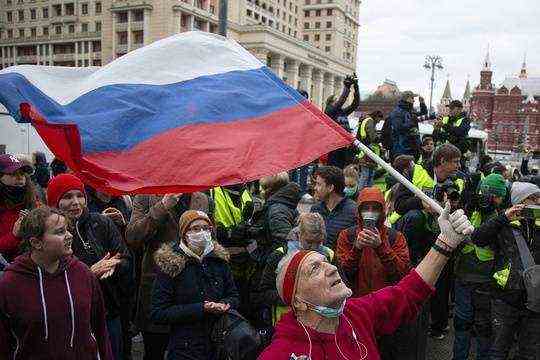A man waves the Russian flag during the demonstration in support of Alexei Navalny, in Moscow on April 21, 2021. – Alexander Zemlianichenko / AP / SIPA
While the opposition demonstrated for the release of Alexey Navalny, Vladimir Putin preferred to attack his Western rivals on Wednesday rather than explicitly mention the opponent. For his big annual speech, the Russian president thus promised foreign countries a “hard” response in the event of provocations. In addition to the fate of Navalny imprisoned and on hunger strike, the very important Russian military deployment on the borders of Ukraine is at the heart of the tensions between Moscow and the West.
Vladimir Putin therefore used the threat in the direction of the international community. “The organizers of provocations threatening our security will regret it as they never had to regret anything,” he warned. “I hope that no one will have the idea of crossing a red line,” he said again, promising an “asymmetric, fast and hard” response.
The coronavirus on the menu of the speech
Russia, because of the conflict in Ukraine, the repression of the opposition, accusations of cyber attacks and interference, is subject to multiple Western sanctions. But the only specific international issue raised by the Russian president on Wednesday was that of an attempted “coup d’état and the assassination of the president.” [de Biélorussie] », Denounced last weekend by the security services of the two countries who saw the hand of opponents supported by the United States.
Domestically, the economic and health crisis due to Covid-19 featured prominently in the speech, especially since legislative elections are scheduled for September. Vladimir Poutine has promised to “ensure the growth of the incomes of the citizens” at half mast for years, under the effect of the sanctions and now also of the pandemic. As the elections approach, he remains popular, but his party, considered corrupt, is hardly so.
Fewer protesters than in January
During Vladimir Putin’s address, thousands of people defied the ban on assembling, especially in Moscow and St. Petersburg where large crowds gathered. The rallies, however, did not reach the scale of the mobilization at the start of the year, after the arrest of Alexei Navalny.
The police response to the demonstrations also appeared more measured than in January except in St. Petersburg where, in a sometimes electric atmosphere, nearly 500 arrests had been counted at 8 p.m. by the specialized NGO OVD-Info. More than 1,200 arrests have been recorded on the whole of Russian territory.

